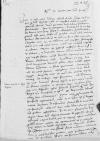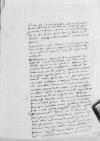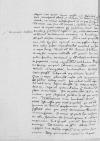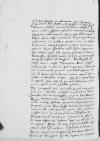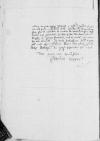Iam in ipso initio litterarum oblitus fueram praecepti illius tui, quo per litteras convenisti mecum, ne turgidis nominibus et titulis chartas oblinirem, tantum pro veteri consuetudine scriberem familiariter. Huic ut obtemperem, perlatae sunt ad me ⌊⌋ de 1535-06-19⌊decima nona Iunii1535-06-19⌋ scriptae in ⌊Altennhaws⌋, quibus nihil gratius esse potuit. Nescio enim, quo fato iterum nobis mortuus dicebare adeo certis indiciis, ut apud me fama fidem inveniret. Augebat eam, quod ex ⌊Madricio⌋ cum orig. quum⌈cumcum orig. quum⌉ ⌊⌋ satis copiose, prout tum res nostrae erant, multis post mensibus nihil de te audirem. Tantum ex ⌊Hispaniis⌋ missae sunt ad me litterae a domino ⌊Fabiano⌋ et ⌊⌋ tuarum ex ⌊Vienna⌋, quae vixisse adhuc mense Decembri superioris anni testabantur, sed praeterea nihil. Laudatus sit itaque Deus, cuius benignitate vivimus quidem adhuc mundo, postea convicturi apud eum in sancta perennitate.
Quominus autem toto mense superiori orig. superiore⌈superiorisuperiori orig. superiore⌉ rescripserim, nam ⌊⌋ Kalendis Augusti ⌊Bruxellae⌋ accepi, in causa fuit profectio ⌊reginae Mariae⌋ ad confinia ⌊regni Francorum⌋, ubi conventum est inter ⌊Leonoram Franciae reginam⌋ et hanc nostram Mariam. Cui conventui interfuit et ⌊Dorothea⌋ ⌊regis Christierni⌋ filia, quae nunc ad sponsum ipsius ⌊Fridericum palatinum⌋ per ⌊dominum de Bergis⌋ nunc marchionem et ⌊reverendissimum dominum Brixinensem⌋ deducitur abiitque hinc nudiustertius. Cum orig. Quum⌈CumCum orig. Quum⌉ itaque perstreperent omnia huiusmodi apparatibus, mihi ex re visum est, si ⌊Brugas⌋ interea advolarem ad inspiciendas fortunulas et curandam rem familiarem, adeo enim huic aulae deditus sum, ut privata omnia publicis postposuerim. In ea cura consumpti sunt dies aliquot, donec litteris ⌊reginae⌋ revocarer ad pistrinum. Hic iam absumptis aliquot diebus, cum ex negotiis negotia nascerentur, pertaesus orig. pertesus⌈pertaesuspertaesus orig. pertesus⌉ eorum quaerere orig. querere⌈quaererequaerere orig. querere⌉ coepi orig. cepi⌈coepicoepi orig. cepi⌉
cf. Cic. Orat. 33.4 Nihil difficile amanti puto ⌊opportunitatem ad te scribendi. Quae volenti ut deesse numquam potestcf. Cic. Orat. 33.4 Nihil difficile amanti puto ⌋, ita aliquando frustra est, praesertim cum non speres facile incidere in tabelliones. Nam quod mensibus fere quattuor ⌊⌋ haeserunt orig. heserunt⌈haeserunthaeserunt orig. heserunt⌉ inter ⌊Hispanias⌋ et ⌊Prussiam⌋, id vero perquam mirum videtur mihi,
 UUB H 154, f. 137v
praesertim cum ad manus dominorum ⌊Fuggarorum⌋ traditae ms 2 fuere,
UUB H 154, f. 137v
praesertim cum ad manus dominorum ⌊Fuggarorum⌋ traditae ms 2 fuere,
ms 1 fuer[...] paper damaged⌈fuerems 2 fuere,
ms 1 fuer[...] paper damaged⌉ et celerrime sint ex ⌊Hispaniis⌋ ⌊Antwerpiam⌋ perlatae. Sed haec ita habere sinamus.
Quod in animum admisisti consolationem meam, quam et tuam fuisse scribis, numquam dubitavi, quin ita faceres, ms 2 nec,
ms 1 ne[...] paper damaged⌈necms 2 nec,
ms 1 ne[...] paper damaged⌉ ob id scripseram, quod te consilii et rationis egentem inventuras fuisse crederem, sed in te confirmando non parum memet ipsum obfirmavi adversus motus favorum et fortunae nebulas. Quem ms 2 enim,
ms 1 [...] paper damaged⌈enimms 2 enim,
ms 1 [...] paper damaged⌉ nostri generis et in aula versatum latent merita tua? ms 2 Quis,
ms 1 Qui[...] paper damaged⌈Quisms 2 Quis,
ms 1 Qui[...] paper damaged⌉ diligentiam et industriam tuam, quam in rem ingratae impendisti, d ignorat? Sane utcumque alii ista interpretentur, ego illi ex animo favere non possum, etiamsi maior esset, quod de inaudito tam ms 2 facile,
ms 1 facil[...] paper damaged⌈facilems 2 facile,
ms 1 facil[...] paper damaged⌉ protulerit. Deferuntur quidem subinde boni viri, at contra illos non nisi a malis creditur. Tu vero pie fecisti, qui cum fruaris optima conscientia, tam facilis fuisti ad ignoscendum, ut ms 2 ne,
ms 1 n[...] paper damaged⌈nems 2 ne,
ms 1 n[...] paper damaged⌉ recorderis quidem eorum, quae adversum te isti.[1] Iudex non
ms 2 deerit,
ms 1 deeri[...] paper damaged⌈deeritms 2 deerit,
ms 1 deeri[...] paper damaged⌉ illis in tempore ⌊Christus⌋, qui modestiam istam tuam non ita ms 2 patietur,
ms 1 patie[...] paper damaged⌈patieturms 2 patietur,
ms 1 patie[...] paper damaged⌉ vanescere. Interea non est, quod de ⌊illius⌋ erga te benignitate diffidas.
cf. Vulg. Ps (H) 93.21.1-2 Copulabuntur adversus animam iusti et sanguinem innocentem condemnabunt ⌊Conspirent illi adversus innocentemcf. Vulg. Ps (H) 93.21.1-2 Copulabuntur adversus animam iusti et sanguinem innocentem condemnabunt ⌋, at
cf. Tac. Dial. 11.4.1-2 nam statum cuiusque ac securitatem melius innocentia tuetur quam eloquentia ⌊illum magis tuebitur sua innocentiacf. Tac. Dial. 11.4.1-2 nam statum cuiusque ac securitatem melius innocentia tuetur quam eloquentia ⌋
, quam quivis
cf. Ilias 10 ⌊⌊Aiacis⌋ clypeuscf. Ilias 10 ⌋.
Iam quod denuo mitti coepisti orig. cepisti⌈coepisticoepisti orig. cepisti⌉ ad munia legationum, ne existimaris adhuc sinistram de te haberi opinionem. Perquam gratum est intelligere te ea esse valetudine, ut adhuc eas obire queas, sed quod gravate eas suscipis, prudenter ut omnia facis. Venisti enim ad stadium neque opus est amplius, ut tibi nomen diligentis et industrii pares. Fides, industria, diligentia tua in aperto. Illis versandum est in huiusmodi muniis, qui famam aut gratiam venantur. Tibi abunde orig. habunde⌈abundeabunde orig. habunde⌉ haec adsunt omnia, immo ipse, quod maius duco, famae et gratiae ob saturitatem contemptus. Quiesce itaque, si potes, in futurum sancto intentus otio orig. ocio⌈otiootio orig. ocio⌉ et labores istos sua sibi habere permitte. Prodesse ⌊reipublicae⌋ etiam sedentarius satis potes.
Quod ⌊⌋ meas anno superiori orig. superiore⌈superiorisuperiori orig. superiore⌉ scriptas ⌊Bellogradi⌋, quas domino ⌊Lasky⌋ tradideram, non receperis, haudquaquam miror, nam ipse tum suspectus fuit ⌊Ioanni⌋, qui se regem vocat,
 UUB H 154, f. 138r
domino tunc suo. Et ob id facile fieri potuit, ut suspectae etiam fuerint ⌊ipsius⌋ litterae, et inter illas meae. Nihil autem refert, quod perlatae non fuerint, animus enim meus ille semper est, qui fuit semper erga te, etiam si scripto non declaretur, quod propter multas occasiones et impedimenta usuvenit.
UUB H 154, f. 138r
domino tunc suo. Et ob id facile fieri potuit, ut suspectae etiam fuerint ⌊ipsius⌋ litterae, et inter illas meae. Nihil autem refert, quod perlatae non fuerint, animus enim meus ille semper est, qui fuit semper erga te, etiam si scripto non declaretur, quod propter multas occasiones et impedimenta usuvenit.
⌊Saxo Carolus⌋ noster laboravit adversa valetudine, iam tamen incipit restitui in pristinam sanitatem. ⌊Illum⌋ tuo nomine salutavi plurimum et egit gratias, teque ex animo resalutat.
De ⌊Fabiano⌋ tuo post unas ab eo receptas litteras ex ⌊Hispaniis⌋, ad quas illi rescripsi, nihil audivi neque satis scio, secutusne ms. secutus ne(!)
⌈secutusnesecutusne ms. secutus ne(!)
⌉ sit ⌊caesarem⌋ in ⌊Aphricam⌋,[2] aut in ⌊Italiam⌋ diverterit, aut substiterit in ⌊Hispaniis⌋. Non dubito tamen, quin de ⌊Ysipe⌋ tua disposuerit. Si contingeret ad hoc litus orig. littus⌈lituslitus orig. littus⌉ appellere ⌊filiam⌋ tuam, ego illam ut meam tractarem. Itidem faceret ⌊uxor⌋ mea, quae absente me non omisit ad ⌊Focharos⌋ et ⌊Welzeros⌋ mittere rescitum, num advenisset. Et nunc, cum de incolumitate tua intelligeret, supra quam scribere possum, gavisa est seque una cum ⌊sorore⌋ et ⌊filia⌋, et ⌊Ascanio⌋, ut scribis, egregie robusto et garrulo, ex animo tibi tuisque commendat. ⌊Balyvus Gandavensis⌋ adhuc bene valet una cum ⌊Michaele⌋ tuo. Fui his diebus ⌊Gandavi⌋. ⌊Illic⌋ per ⌊dominum de Heulle⌋ facta est tui honorifica mentio gaudebatque is plurimum, quod ex mortuo nuntiato orig. nunciato⌈nuntiatonuntiato orig. nunciato⌉ revixisses. Idem fecit ⌊reverendissimus Panhormitanus⌋.
De iis, quae de ⌊Daniae regno⌋ scribis, fueram prius certior factus, praesertim orig. presertim⌈praesertimpraesertim orig. presertim⌉ de conatu ⌊Alberti ducis Mechelburgensis⌋, qui illi haud satis cessit feliciter orig. foeliciter⌈feliciterfeliciter orig. foeliciter⌉. Iam et conatus aliorum, quos enumeras, non erant nobis in obscuro, sed ⌊Fridericus palatinus dux⌋ omnium minime videtur quieturus. Itaque serenisima ⌊regina Maria superinscribed⌈MariaMaria superinscribed⌉⌋ partes suas interponere voluit, ut boni
 UUB H 154, f. 138v
aliquid inter partes componi possit, sed ⌊Holsatus⌋, adiutorio ⌊marchionis Alberti⌋ et aliorum, et victoria quoque elatus, non videtur condescensurus in ea, quae sunt pacis. Ne tamen non sint omnia tentata, ⌊caesaera maiestas⌋ ordinavit, ut aliquot nostrum, scilicet ⌊Guilielmus comes de Renneberg⌋, ⌊Godtscalcus⌋ noster et ego, proficisceremur ad conventum Vandalicarum civitatum[3] in ⌊Luneburgo⌋, ad quod iter iam accingimur. Summa rerum proponendarum erit, quod scire cupiemus, an non possint aliqua bona media haberi ad pacificandos tumultus, qui sunt in ⌊regno Daniae⌋, nimium enim diu duravit id bellum et non sine maximo incommodo omnium partium, nec illud quidem ferendum erit ulterius, quod nonnulorum ambitione et impotentia maria navigantibus occluduntur, diripiuntur fortunae pauperum, ceduntur, vinciuntur miseri Hollandi ab utraque parte ⌊Lubicensibus⌋, ⌊Holsatis⌋, ⌊Swetis⌋, ⌊Prussis⌋. Indigna res, quae toleretur diutius.
UUB H 154, f. 138v
aliquid inter partes componi possit, sed ⌊Holsatus⌋, adiutorio ⌊marchionis Alberti⌋ et aliorum, et victoria quoque elatus, non videtur condescensurus in ea, quae sunt pacis. Ne tamen non sint omnia tentata, ⌊caesaera maiestas⌋ ordinavit, ut aliquot nostrum, scilicet ⌊Guilielmus comes de Renneberg⌋, ⌊Godtscalcus⌋ noster et ego, proficisceremur ad conventum Vandalicarum civitatum[3] in ⌊Luneburgo⌋, ad quod iter iam accingimur. Summa rerum proponendarum erit, quod scire cupiemus, an non possint aliqua bona media haberi ad pacificandos tumultus, qui sunt in ⌊regno Daniae⌋, nimium enim diu duravit id bellum et non sine maximo incommodo omnium partium, nec illud quidem ferendum erit ulterius, quod nonnulorum ambitione et impotentia maria navigantibus occluduntur, diripiuntur fortunae pauperum, ceduntur, vinciuntur miseri Hollandi ab utraque parte ⌊Lubicensibus⌋, ⌊Holsatis⌋, ⌊Swetis⌋, ⌊Prussis⌋. Indigna res, quae toleretur diutius.
Cum orig. Qum⌈CumCum orig. Qum⌉ et vestri ⌊Gedanenses⌋ nescio quid conqueruntur de subditis ⌊caesareae maiestatis⌋, pro quibus d(iffe)r(e)n(t)iis or d(isc)r(epa)n(t)iis⌈d(iffe)r(e)n(t)iisd(iffe)r(e)n(t)iis or d(isc)r(epa)n(t)iis⌉ componendis nobis etiam dabitur commissio, si aderunt vestri, bene est, nihil enim quaerimus orig. querimus⌈quaerimusquaerimus orig. querimus⌉ ultra, quam bonis mediis sopire controversias. Per eos redeuntes ad sua, non omittam, quin scripturus sim ad te de iis, quae occurrent. Intelligimus etiam Lubicensi senatu eiectos esse nescio quos viros improbos, qui res omnes humanas et divinas prophanarunt. In eorum locum suffectos alios, qui prius exulaverant, b written over v⌈vbb written over v⌉onos illos et circumspectos. Si verum est penes hos auctoritatem orig. authoritatem⌈auctoritatemauctoritatem orig. authoritatem⌉ esse, sperandum est daturos operam, ut res bene componantur, et id est, quod petimus. Brevi sciemus omnia haec. De navibus ab illustrissimo ⌊Alberto duce⌋ in subsidium ⌊ducis Holsatiae⌋ missis ad nos pridem fama pervenit. Deus principibus mentem det ad pacem
 UUB H 154, f. 139r
et tranquillitatem, potius quam ad huiusmodi bella, quae vereor, ne brevi renascantur, cum orig. quum⌈cumcum orig. quum⌉ credentur extincta esse etc.
UUB H 154, f. 139r
et tranquillitatem, potius quam ad huiusmodi bella, quae vereor, ne brevi renascantur, cum orig. quum⌈cumcum orig. quum⌉ credentur extincta esse etc.
De expeditione vestra adversus ⌊Moscum⌋ etiam audivi. Scripsit de eadem ad me etiam praefatus dominus ⌊Lasky⌋ iam liber a catenis orig. cathenis⌈cateniscatenis orig. cathenis⌉ et compedibus Hungaricis. O praemia orig. premia⌈praemiapraemia orig. premia⌉ pro tot laboribus, periculis, expensis! Et solent huiusmodi laborum talia esse. Mihi in ⌊eo viro⌋ plurima placent, ingenium, industria, vis animi, laborum tolerantia, periculorum contemptus, eruditio, dexteritas, et quae non? Tantum incidit in male fortunatos dominos, sed meliora erunt futura. Scripsit inter alia, qualiter omnia bona, quae habuisset in ⌊Hungaria⌋, libere dimisisset in manibus ⌊regis⌋, cui inservierat, seque sacramento, quod illi praestiterat, absolvisset, meditareturque redire in ⌊Syradiam⌋ suam prius reconciliatus ⌊Ferdinando regi Rhomanorum⌋ opera ⌊reverendissimi Lundensis⌋ nostri. Quod si fecerit, egregie sibi prospexerit expertus infidelitatem multorum et suo iam doctus periculo, quam parum fidendum sit splendidis promissionibus.
Ceterum, quod scribis satius fuisse futurum, si in initiis pax facta fuisset, quae haberi poterat honesta et commoda, in eadem tecum sum opinione. Plures ad bellum sunt viae, sed ad pacem una tantum, quae victori placet. Et ex tot casibus, quos pertulimus et alios perferre vidimus, edocti sumus
cf. Ter. Eu. 789 omnia prius experiri quam armis sapientem decet ⌊omnia prius quam armis experiricf. Ter. Eu. 789 omnia prius experiri quam armis sapientem decet ⌋ etc. Sed solet Deus huiusmodi animos immittere principibus, quos castigare vult, prout vidimus in ⌊caesare Thurcarum⌋ accidisse, qui cum priore mea in superinscribed⌈inin superinscribed⌉ legatione per ⌊Imbrahimum Bassam⌋ mihi dici iussisset, si vellet ⌊Karolus caesar⌋ in pacem aliquam solidam intendere, se neutiquam ab eadem abhorrere. Et in secunda legatione mea idem ⌊Karolus caesar⌋ mihi commisisset, siquidem ⌊Thurcarum caesar⌋ honesta media proponi curaret,
 UUB H 154, f. 139v
se a pace honesta et condicionali orig. conditionali⌈condicionalicondicionali orig. conditionali⌉ non abhorrere. Atque interim, dum abessem, ita fuisset inversus ipsius ⌊Thurcarum caesaris⌋ animus, ut bellum nobiscum quam pacem mallet confisus in quorundam vanis pollicitationibus. Experientia nobis cognitum est, quod post illud tempus defecit gloria ⌊Othomannorum⌋, et qui prius vincere consueverunt, iam passim written over s⌈smm written over s⌉ a ⌊Parthis⌋ terra, a ⌊caesare Karolo⌋ mari terraque victi sunt atque exuti provincia ⌊Aphrica⌋, ex qua sperabant nobis iugum imponere. Ipse ⌊Aloisius Griti⌋ belli auctor orig. author⌈auctorauctor orig. author⌉ et vocati in Thraciam ⌊Barbarossae⌋, quamquam postea ductus est facti poenitentia orig. penitentia⌈poenitentiapoenitentia orig. penitentia⌉, caesus orig. cesus⌈caesuscaesus orig. cesus⌉ tamen est misere ab ⌊Hungaris⌋. ⌊Barbarossa⌋ omni classe exutus amisit ⌊Thunetum⌋, ⌊Bonam⌋, ⌊Clypeam⌋, ⌊Hadrumentum⌋ et alia omnia, quae occupaverat, praeter machinas et munitiones, quarum ingens vis reperta, et haec omnia parva immo nulla cum iactura copiarum ⌊Karoli caesaris⌋ et brevissimo tempore. Ista sunt opera dexterae Dei excelsi, quae adest iis, qui pacem sectantur et diligunt, et perdit gentes, quae bella quaerunt orig. querunt⌈quaeruntquaerunt orig. querunt⌉.
UUB H 154, f. 139v
se a pace honesta et condicionali orig. conditionali⌈condicionalicondicionali orig. conditionali⌉ non abhorrere. Atque interim, dum abessem, ita fuisset inversus ipsius ⌊Thurcarum caesaris⌋ animus, ut bellum nobiscum quam pacem mallet confisus in quorundam vanis pollicitationibus. Experientia nobis cognitum est, quod post illud tempus defecit gloria ⌊Othomannorum⌋, et qui prius vincere consueverunt, iam passim written over s⌈smm written over s⌉ a ⌊Parthis⌋ terra, a ⌊caesare Karolo⌋ mari terraque victi sunt atque exuti provincia ⌊Aphrica⌋, ex qua sperabant nobis iugum imponere. Ipse ⌊Aloisius Griti⌋ belli auctor orig. author⌈auctorauctor orig. author⌉ et vocati in Thraciam ⌊Barbarossae⌋, quamquam postea ductus est facti poenitentia orig. penitentia⌈poenitentiapoenitentia orig. penitentia⌉, caesus orig. cesus⌈caesuscaesus orig. cesus⌉ tamen est misere ab ⌊Hungaris⌋. ⌊Barbarossa⌋ omni classe exutus amisit ⌊Thunetum⌋, ⌊Bonam⌋, ⌊Clypeam⌋, ⌊Hadrumentum⌋ et alia omnia, quae occupaverat, praeter machinas et munitiones, quarum ingens vis reperta, et haec omnia parva immo nulla cum iactura copiarum ⌊Karoli caesaris⌋ et brevissimo tempore. Ista sunt opera dexterae Dei excelsi, quae adest iis, qui pacem sectantur et diligunt, et perdit gentes, quae bella quaerunt orig. querunt⌈quaeruntquaerunt orig. querunt⌉.
De ⌊Campensi⌋ tuo nihil audio penitus neque miror, quod illi cum ⌊Aleandro⌋, ut scribis, non satis bene convenit. Quomodo enim inter diversissima ingenia bene conveniret? Quod auctorem orig. authorem⌈auctoremauctorem orig. authorem⌉ scire cupis illius ⌊⌋ ⌊Campensis⌋, audio illum fuisse ⌊Udalrichum Zwinglium⌋ eruditum, sed malo hominem ingenio. Illius exemplaria misissem ad te duo ad tria, si ad manum fuissent, sed bibliopolae iam omnia vendiderunt. Curavimus tamen a written over ...⌈... illegible⌈...... illegible⌉aa written over ...⌉liquot de novo afferri orig. adferri⌈afferriafferri orig. adferri⌉ ex ⌊Lugduno⌋, quae cum tempore sum ad te missurus, facile enim erit in futurum, si bella cessaverint, ad te litteras mittere. ⌊⌋ tua veteri ex Helicone quantum me compluresque viros bonos oblectarit, facilius est tibi cogitare, quam mihi exprimere.
⌊Granvel UUB H 154, f. 140rlanus⌋ ⌊uxore⌋ ex ⌊Hispaniis⌋ in ⌊Burgundiam⌋ transmissa apud ⌊caesarem⌋ est nunc ⌊Neapoli⌋ et fuit una in ⌊Aphrica⌋.
UUB H 154, f. 140rlanus⌋ ⌊uxore⌋ ex ⌊Hispaniis⌋ in ⌊Burgundiam⌋ transmissa apud ⌊caesarem⌋ est nunc ⌊Neapoli⌋ et fuit una in ⌊Aphrica⌋.
⌊Grudii fratres⌋ Hispanicum aerem non ferentes reversi sunt in ⌊patriam⌋. ⌊Alter⌋ adeptus est consiliarii locum in ⌊Hollandia⌋.
De ⌊Indiis⌋ non habeo certi aliquid, quod ad te scribam, neque de ⌊Cortesio⌋, nisi quod bene valet, et auri in dies plus ex illis regionibus in ⌊Hispanias⌋ advehitur manifesto miraculo. De iis rebus plura possunt mercatores ad te scribere, quorum sitis omnis ad aurum est. Quod de dissidio ⌊Hieronymi Sayler⌋ cum ⌊Ulricho Ehinger⌋ scribis, ita fuit, sed audio rem inter eos pacatam. Optimus quisque et qui materiam novit, a partibus ⌊Sayleri⌋ stetit. ⌊Compatri⌋ tuo plus inest fastus et verborum, quam ut multi ferre velint aut queant. De ⌊utroque⌋ a multis diebus nihil audivi neque mirum, cum orig. quum⌈cumcum orig. quum⌉ ⌊caesar⌋ afuerit orig. abfuerit⌈afueritafuerit orig. abfuerit⌉ ab ⌊Hispaniis⌋ ideoque minus commeent cursores.
Iis diebus venit ab ⌊Hispaniis⌋ ⌊marchionissa de Zenette⌋ uxor domini ⌊Henrici comitis de Nassaw⌋ transactura reliquum vitae cum marito in hac ⌊patria⌋. Valedixit enim idem dominus ⌊Henricus⌋ ⌊Hispaniae⌋ et ⌊caesari⌋ fuitque iam hic annum integrum pertaesus orig. pertesus⌈pertaesuspertaesus orig. pertesus⌉ aulicae servitutis. Arcem aedificavit orig. edificavit⌈aedificavitaedificavit orig. edificavit⌉ et munivit in oppido ⌊Breda⌋ suo valde fortem et inexpugnabilem. In eam invexit bombardas illas quadraginta quattuor aeneas, quas conflari iussit ⌊Augustae⌋, dum illic essemus, cum ingenti orig. ingente⌈ingentiingenti orig. ingente⌉ vi rerum necessariarum. ⌊Illic⌋ agit parum curans aulam nostram et raro ad eandem orig. eamdem⌈eandemeandem orig. eamdem⌉ se conferens. Post ⌊reginam Mariam⌋ et illum superinscribed⌈et illumet illum superinscribed⌉ primas tenet
ill(ustris) or ill(ustrissimus)⌈ill(ustris)ill(ustris) or ill(ustrissimus)⌉
⌊dux de Arschot⌋, sed valetudine impeditus et ipse abest plurimum. ⌊Lynken Bruxellensis⌋, quam nosti, frequenter ex me sciscitatur de valetudine tua aitque se ad te ⌊⌋. Cuperet sibi responderi. Scribe ad ⌊miseram⌋ et illam consolare, et mitte ad me litteras, et quid factum voles, significa. Est et ⌊Bruxellis⌋ vicina mea ⌊de Baillieul⌋,
 UUB H 154, f. 140v
nutrix, ut puto, ⌊reginae Mariae⌋, quae ⌊filium⌋ apud te se habere ait, ad ⌊quem⌋ mihi litteras dedit, sed illae nunc ad manum non sunt. Fac, ut rescribat ad ⌊matrem⌋ de valetudine sua.
UUB H 154, f. 140v
nutrix, ut puto, ⌊reginae Mariae⌋, quae ⌊filium⌋ apud te se habere ait, ad ⌊quem⌋ mihi litteras dedit, sed illae nunc ad manum non sunt. Fac, ut rescribat ad ⌊matrem⌋ de valetudine sua.
Dominae ⌊matri⌋ tuae, ⌊sororibus⌋ et ⌊Bernhardo⌋ commilitoni meo in ⌊Burgos⌋, et ⌊Georgio⌋, fratribus tuis et meis me iterum ex animo commenda. Et vale felicissime orig. foelicissime⌈felicissimefelicissime orig. foelicissime⌉, Domine et Pater animo meo observandissime. Brevi ad te plura perscribam.
 UUB H 154, f. 137v
praesertim cum ad manus dominorum
UUB H 154, f. 137v
praesertim cum ad manus dominorum  UUB H 154, f. 138r
domino tunc suo. Et ob id facile fieri potuit, ut suspectae etiam fuerint
UUB H 154, f. 138r
domino tunc suo. Et ob id facile fieri potuit, ut suspectae etiam fuerint  UUB H 154, f. 138v
aliquid inter partes componi possit, sed
UUB H 154, f. 138v
aliquid inter partes componi possit, sed  UUB H 154, f. 139r
et tranquillitatem, potius quam ad huiusmodi bella, quae vereor, ne brevi renascantur, cum orig. quum⌈cumcum orig. quum⌉ credentur extincta esse etc.
UUB H 154, f. 139r
et tranquillitatem, potius quam ad huiusmodi bella, quae vereor, ne brevi renascantur, cum orig. quum⌈cumcum orig. quum⌉ credentur extincta esse etc.
 UUB H 154, f. 139v
se a pace honesta et condicionali orig. conditionali⌈condicionalicondicionali orig. conditionali⌉ non abhorrere. Atque interim, dum abessem, ita fuisset inversus ipsius
UUB H 154, f. 139v
se a pace honesta et condicionali orig. conditionali⌈condicionalicondicionali orig. conditionali⌉ non abhorrere. Atque interim, dum abessem, ita fuisset inversus ipsius  UUB H 154, f. 140rlanus
UUB H 154, f. 140rlanus UUB H 154, f. 140v
nutrix, ut puto,
UUB H 154, f. 140v
nutrix, ut puto, 